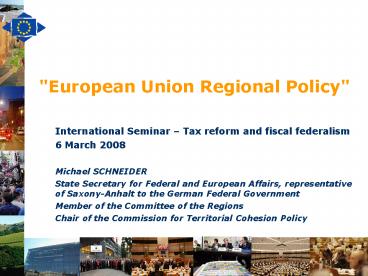European Union Regional Policy - PowerPoint PPT Presentation
1 / 22
Title:
European Union Regional Policy
Description:
... and European Affairs, representative of Saxony-Anhalt to the German Federal Government ... A political assembly of the EU, representing local and regional ... – PowerPoint PPT presentation
Number of Views:264
Avg rating:3.0/5.0
Title: European Union Regional Policy
1
"European Union Regional Policy"
- International Seminar Tax reform and fiscal
federalism - 6 March 2008
- Michael SCHNEIDER
- State Secretary for Federal and European Affairs,
representative of Saxony-Anhalt to the German
Federal Government - Member of the Committee of the Regions
- Chair of the Commission for Territorial Cohesion
Policy
2
The Committee of the Regions
- A political assembly of the EU, representing
local and regional government - To give local and regional government a say over
the drafting of EU legislation - To bring Europe closer to its citizens
- To provide a meeting place where regions and
cities can share best practice and take part in a
dialogue with the European institutions
3
Regional policy in the Treaties
- Treaty of Rome (1957) gt No title
for regional policy - Single European Act (1986) gt First
reference to economic and social cohesion (the EU
shall aim at reducing disparities) - Treaty on European Union (1992) gt Names cohesion
as one of the EUs main goals
4
Enlargements
- 1973 Denmark, Ireland and the UK
- 1981 Greece
- 1986 Portugal and Spain
- 1990 German reunification
- 1995 Austria, Finland, and Sweden
- 2004 Cyprus, Czech Republic, Estonia, Hungary,
Latvia, Lithuania, Malta, Poland, Slovakia, and
Slovenia - 2007 Bulgaria and Romania
5
12 new Member States(2004 and 2007 enlargements)
Gain in population
105 million inhabitants
Gain in GDP
5 of EU-15 GDP (former Member States)
Disparities
98 millions inhabitants over 105 live in Regions
where GDP per capita is inferior to 75 of the
EU average
6
New global challenges
- Globalisation
- Productivity
- Demographic change
- Climate change
- Skills for a knowledge-based economy
7
New Budget Structure Cohesion Policy gains2006
vs. 2013 in
8
Cohesion Policy 2007-2013
- A more strategic policy
- Research
- Innovation
- Entrepreneurship
- Transport
- Environment
- Simplification
- 3 funds for 3 objectives
9
Objectives, Structural Funds and
instruments2007-2013
Objectives
Structural Funds and instruments
ERDF
Cohesion Fund
Convergence
ESF
Regional Competitiveness and Employment
ERDF
ESF
European territorial Cooperation
ERDF
10
Cohesion Policy 2007-2013 Split by objectives in
billion Euro (total EUR 307 billion)
Convergence Regional competitiveness and
employment European territorial cooperation
11
(No Transcript)
12
Convergence-Objective Regions below 75 of EU25
GDP Average 2000-2002
Allocation EUR 177.8 bn
13
Convergence Objective Regions below 75 of EU15
GDP (statistical effect/ phasing-out regions)
Allocation EUR 12.5 bn
14
Objective Regional Competitiveness and
Employment Phasing-in regions (covered by
Objective 1 between 2000-2006, now above 75)
Allocation EUR 10.38 bn
15
Objective Regional Competitiveness and
Employment (all other regions)
Allocation EUR 38.4 bn
16
Three funds 3 tools to achieve 3 objectives
- The Cohesion Fund
- GNI per capita lt 90 EU average
- Transport networks
- Environment
- The ERDF
- Aid to investments in companies (SMEs)
- Infraestructure RD, telecom, environment,
transport and energy - Financial instruments
- The ESF
- Adapting workers and enterprises
- Employement
- Social integration
- Human capital
17
Implementation principles
- Concentration
- Programming
- Partnership
- Additionality
18
Strategic guidelines, programming and follow-up
19
Financing Differentiation of co-financing rates
Criteria
Member States, regions
ERDF, ESF
Cohesion Fund
(1) Member States whose average per capita/ GDP
below 85 between 2001-03
CZ, EE, GR, CY, LV, LT, HU, MT, PL, PT, SI, SK,
BG, RO
85
85
(2) Member States other than those under (1)
eligible to the Cohesion Fund
ES
80/50
85
(3) Member States other than those under (1) and
(2)
AT, BE, DK, DE, FR, IR, IT, LU, NL, SE, SF, UK
75/50
-
(4) Outermost regions referred to in Article 299
(2) of the Treaty
regions in ES, FR, PT
85
85
The first rate concerns regions eligible under
the "Convergence" the second one those under
the "Regional Competitiveness and Employment"
objective If applicable
20
Leverage effect of structural funds (opinion
study by the CoR)
- Financial multiplier effect
- Strategic policy orientation
- Institutional capacity building
- Cohesive building of Europe
21
Possible growth and employment effects
- Growth Major gains in terms of additional GDP of
approximately 10 in most new MS by 2013 (8.9 in
Poland, more than 10 in Baltic States). - Productivity Gains vary between 2.3 (Slovakia
Hungary) and 7 (Bulgaria Romania). - Employment Overall 2.5 million new jobs (between
4 to 8).
22
- Thank you for your attention!!































